Imam Ali (A.S.) is the Holy Prophet’s Soul
It is made clear that the phrase “our souls” cannot be taken to mean the Prophet (saws) himself and since the narrations already cited confirm that those who were present during the contest of prayers were Ali (as), Fatimah (sa),Al–Hasan (as) and Al–Husain (as), God’s blessing on them all, it follows that the phrase “our soul” applies to no one other than Ali (as), and this is one of his outstanding merits, or perhaps one of the most remarkable virtues.

In these Qur’anic words, Ali (as) is referred to as the Prophet’s soul. Because an individual has only one soul, and because it will be meaningless to say that Ali (as) is really the Prophet’s soul, it is apparent that the word ‘soul’ is not used in its literal meaning, rather it indicates his similarity (to the Prophet).
Since this similarity between them is absolute, it follows that Ali (as) enjoys each and every attribute of perfection and dignity that the Prophet (saws) has, except that which logic has excluded, and that is being a prophet. Consequently he enjoys all the perfections and particularities which the Prophet has, such as leadership over the people and superiority over all human beings including the past prophets.
Given this, the Qur’anic verse provides an evidence for the imamate of Ali (as), his superiority over the community after the Prophet (saws) and his outstanding precedence over other Prophets.
Fakhr al–Razi’s Comments on the Verse of Mubahalah
In his al–Tafseer al–Kabir, Fakhr al–Razi says “There lived in Ray a teacher who followed Twelver Shi’ism.1 he maintained that Ali had priority over all prophets except Mohammad (saws). This man used to say, ‘An indication of Ali’s superiority over all the earlier prophets is the verse of mubahalah wherein God, the Most High, says, “and our souls and your souls”.
This, “Our souls”, does not mean the Prophet (saws) himself because one cannot call one’s self. Therefore, it implies someone else, namely Ali ibn Abi Talib (as), peace be on him, an idea on which there is a consensus of opinion.
The Qur’anic verse, therefore, means that Ali is the Prophet’s “soul”, God bless them both. Since it is impossible for Ali (as) to be actually the Prophet, the phrase naturally means this soul is similar to that soul, which entails that both have the same characteristics except for two things prophet hood, (nubuwwat) and Ali’s superiority over the Prophet, because all agree that Ali (as) is not a prophet, nor is he superior to the Prophet (saws).
He (Hamsi al–Razi) adds, ‘This argument is confirmed by a hadith accepted by both supporters and opponents. In this hadith the Prophet states,” If one desires to see Adam (as) in his knowledge, Noah (as) in his piety, Ibrahim (as) in his friendship (with God), Moses in his awe of God, Jesus (as) in his devotion to God, one can look at Ali, God’s peace and blessing be on him’.
Fakhr al–Razi continues “Other learned Shi’ite scholars cite the stated Qur’anic verse as a proof to support the idea that Ali, peace be on him, is superior to any one of the Companions because when the Qur’anic verse considers Ali’s soul similar to that of the Prophet’s (saws) except for what is excluded by reason, and since the Prophet’s soul is superior to any one of the companions’, then Ali’s soul. is superior to any one of the Companions”.
Fakhr al–Razi, however, raises an objection to one of the sentences in this argument. This will be discussed and answered in the final part of the questions about the verse.
The Narrations that Consider Ali (as) as the Prophet’s Soul
The narrations that consider Ali (as) as the Prophet’s soul can be grouped under three headings
Narrations about the Verse of Mubahalah
Some of these narrations deal with the presence of the five pure ones, the people of Kisa, in the prayer of contest, as we have already stated. Below are brief sentences about this subject
1. Having quoted the Qur’anic verse (of Mubahalah), ibn Abbas says, “and Ali is the Prophet’s soul”, as confirmed by the verse of mubahalah.2
2. After quoting Jabir ibn Abdullah al–Ansari’s words concerning the Prophet’s family, (Ahl al–Bayt) (p.b.u.th.), Sh’abi says, by “our sons” al–Hasan and al–Husain, are meant by “our women” Fatimah and by “our souls” Ali ibn Abi Talib”.3
3. Having mentioned the authenticity of the reports related from ibn Abbas and other Companions about the fact that the Prophet (saws) had brought with him Ali, Fatimah and al–Hasan and al–Husain to the contest of prayer, Hakim Nayshaburi establishes the authenticity of the reports which hold that “our son” refers to al–Hasan and al–Husain, “our women” to Fatimah and “our souls” to Ali ibn Abi Talib.4
4. According to the narration wherein Ali, peace be on him, has the members of the consultative assembly swear, he says, “I adjure you by God to tell me whether there is anyone from among you who is closer to the Prophet in kinship than I am, or whom the Prophet called “my soul”, and whose sons the Prophet called “my sons” They said “There isn’t”.5
Narrations Concerning Bani Wali’ah Clan
These narrations have been quoted from a number of Companions such as Abu Dhar, Jabir ibn Abdullah and Abdullah ibn Hantab According to these narrations, the Prophet (saws) has, as stated by Abi Dhar, said “The (people of) Bani Wali’ah (tribe) have to submit or, I will send to them someone who is similar to me to execute my orders, kill those who fight, and capture their offspring”.6
Abu Dhar adds, “Umar, who was standing behind me, asked, “Whom does the Prophet mean”
I said, “Neither you nor your friend (Abu Bakr)”.
He asked, “Who is that person, then”
I said, “He is the one who is mending his shoes now”.
He said, “It is who is mending his shoes”.
Narrations about the Beloved of the Prophet (saws)
Some narrations report that the Prophet (saws) was asked about the best or most beloved person by him. After the Prophet (saws) answered he was asked about Ali’s popularity and precedence over others. So, the Prophet (saws) turned to his companions and said “This man is asking me about my soul” indicating to Ali (as) who is the Prophet’s soul.7
Some other narrations report that once Hazrat Fatimah, God’s blessing be on her, asked the Prophet (saws) to make a mention about Ali (as). The Prophet said, “Ali is my soul. Can a person speak about his own soul8
These hadiths have been reported on the authority of a number of Companions such as Amr Aas, A’isheh, and Amr ibn Shoayb’s grandfather.
From these narrations, which are great in number and varied in the manner of transmission we realize that Ali (as) is the soul of the Prophet (saws) and the Qur’anic verse emphasizes on the similarity between them, except for what is definitely and logically excluded, e.g. Prophet Hood.
Accordingly, all the other merits and characteristics which the Prophet enjoys, such as his superiority over the community and over the whole creation and his leadership over the whole Islamic community, are included in this similarity.
Notes
1. – According to the accounts written in some books about this great scholar, thus mentioned by Fakhr al-Razi, he is a renowned Shi’ite mujtahid, theologian, and professor of Fakhr al-Razi, whom the late traditionist, Qommi, mentions in volume 1, page 340 of his Safinah al-Bihar and says “Sheikh Sadeed al-Deen Mahmood ibn Ali ibn al-Hasan al-Himsi of Rayy, is a religious scholar, an authority on theology and author of al-Ta’leeq al-Iraqi, a book on rhetoric”. Sheikh Baha’i has been quoted as saying “He was a learned scholar among the Shi’ite ulama. He came from Hims, a village in Rayy, now a ruin.
Safina al-Bihar, vol.1, p.340, Kitabkhana Mahmuod.
The late Sayyid Mohsen Amin Jibal Ameli quotes from a manuscript of al-Ta’leeq al-Iraqi or al-Munqidh min al-Taqleed, on which the following sentence is written “This is written by our master, the great Sheikh, Hojjat al-Islam wal-Muslimin, the Tongue of the Sect and theologians, the Lion of Debaters, Mahmood ibn Ali ibn al-Hasan al-Himsi, may God prolong his life in glory and humiliate his enemies”. Ayan al-Shiah, vol. 10, p. 105, Dar al-Ta’aruf lil Matbo’at, Beirut.
In Al-Qamoos al-Moheet vol.2, p.299, Dar al-Ma’rifah, Beirut. Firoozabadi refers to Himsi and says Mahmood ibn Ali al-Himsi is a theologian and al-imam Fakhr al-Deen’s teacher”.
From the above statement of Firoozabadi we realize that this eminent theologian was Fakhr al-Razi’s teacher, a position which has not been mentioned by Fakhr al-Razi.
2. – Ma’rifaht Uloom al-Hadith, p. 50, Dar al-Kutub al-Illmiyyah, Beirut.
3. – Asbab al-Nuzool, [. 67, Dar al-Kutub al-Ilmiyyah, Beirut.
4. – Ma’rifaht Uloom al-Hadith, p. 50, Dar al-Kutub al-Illmiyyah, Beirut.
5. – The History of the City of Damascus, vol. 42, p. 431, Dar al-Fikr.
6. – Al-Sunan al-Kobra lil–Nisai’i, vol. 5, p. 127; Dar al-Kutub al-Ilmiyyah, Beirut; a research–worker has said, “There are trustworthy narrators within the chain of narrators of the hadit.
al-Musannaf li–ibn Abi Shaybah, vol. 6, p. 374; Dar al-Taj; al-Mo’jam al-Awsat lil–Tabarani, vol. 4, p. 477; Maktabat al-Moarif, Riadh
Note al-Mo’jam al-Awsat has used the word “Li–Nafsi” rather than “Ka–Nafsi”, this being an error, intentional or otherwise, for Haythami who had quoted Tabarani in his Majma’ al-Zawai’d used the word “Ka–Nafsi”.
Majma’ al-Zawai’d of Haythami, vol. 7, p. 110, Dar al-Kitab al-Arabiyyah, also p. 240 (of the same source printed) by Dar al-Fikr.
7. – Al-Suyuti’s Jami’ al-Ahadith,, vol. 16, pp. 256–7, Dar al-Fikr; Kanz al-Ummal, vol. 13, pp. 142–3, al-Risalih Institute.
8. – Al- Khawrazmi’s Manaqib, p. 148, Mu’asasat al-Nashr al-Islami; Maqtal al-Husain, p. 43, Maktabat al-Mufeed.
Source: www.alhassanain.org/english
این مطلب بدون برچسب می باشد.



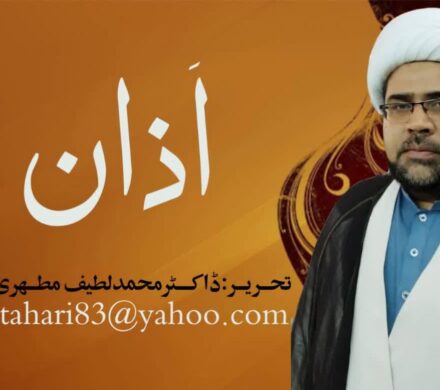
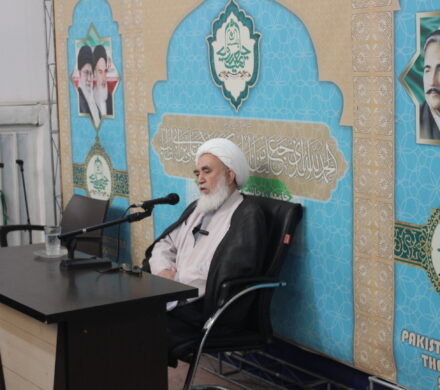
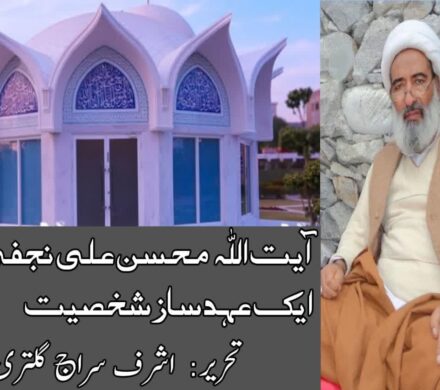



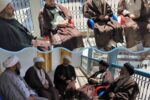

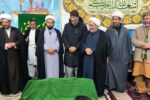

دیدگاهتان را بنویسید